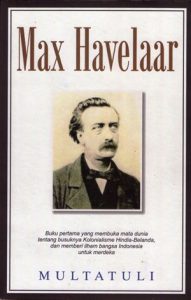Max Havelaar

Author: Multatuli (Eduard Douwes Dekker)
Publisher: Penerbit Narasi
Year of Publication: 1860 (First Publication), 2008 (This Edition)
Print Length: 396 pages
Genre: Autobiographical Novel, Historical Fiction, Classical Fiction, Literary Fiction
Language: Indonesian
Topic: Colonialism & Post-Colonialism, Trade, Independence & Liberation
One of the most forceful indictments of colonialism ever written and a masterpiece of Dutch literature. This novel was published in Dutch with the original title “Max Havelaar, of de koffij-veilingen der Nederlandsche Handel-Maatschappij” (English: “Max Havelaar, or the Coffee Auctions of the Dutch Trading Company”; Indonesian: “Max Havelaar, atau Lelang Kopi Perusahaan Dagang Belanda”).
Max Havelaar—a Dutch civil servant in Java—burns with an insatiable desire to end the ill treatment and oppression inflicted on the native peoples by the colonial administration. Max is an inspirational figure, but he is also a flawed idealist whose vow to protect the Javanese from cruelty ends in his own downfall. In Max Havelaar, Multatuli (pseudonym for Eduard Douwes Dekker) vividly recreated his own experiences in Java and tellingly depicts the hypocrisy of those who gained from the corrupt coffee trade. Sending shockwaves through the Dutch nation when it was published in 1860, this damning exposé of the terrible conditions in the colonies led to welfare reforms in Java and continues to inspire the Fairtrade movement today.
Salah satu mahakarya sastra Belanda. Novel ini terbit dalam bahasa Belanda dengan judul asli “Max Havelaar, of de koffij-veilingen der Nederlandsche Handel-Maatschappij” (bahasa Inggris: “Max Havelaar, or the Coffee Auctions of the Dutch Trading Company”; bahasa Indonesia: “Max Havelaar, atau Lelang Kopi Perusahaan Dagang Belanda”).
Max Havelaar—seorang pegawai negeri Belanda di Jawa—berkeinginan untuk mengakhiri perlakuan buruk dan penindasan yang dilakukan pemerintah kolonial terhadap masyarakat pribumi. Max adalah sosok inspiratif, namun ia juga seorang idealis cacat yang sumpahnya untuk melindungi masyarakat Jawa dari kekejaman berakhir dengan kehancurannya sendiri. Dalam Max Havelaar, Multatuli (nama samaran untuk Eduard Douwes Dekker) dengan gamblang menceritakan kembali pengalamannya di Jawa dan dengan jelas menggambarkan kemunafikan orang-orang yang memperoleh keuntungan dari perdagangan kopi yang korup. Ketika buku ini diterbitkan pada tahun 1860, paparan yang memprihatinkan mengenai kondisi buruk di wilayah jajahan mengejutkan bangsa Belanda, sehingga berujung pada reformasi kesejahteraan di Jawa dan terus menginspirasi Gerakan Fairtrade hingga saat ini.
Table of Contents
Chapter 1. “Saya adalah makelar kopi, dan tinggal di Lauriergracht No. 37, Amsterdam.” / “I am a coffee broker, and live at Lauriergracht No. 37, Amsterdam.”
Chapter 2. “Segala sesuatu berjalan dengan lambat di Pasar Transaksi, namun lelang pada musim gugur tidak diragukan lagi telah meletakkan beberapa hal dengan benar.” / “Things have been moving slowly in the Transaction Market, but the fall auctions have undoubtedly put some things right.”
Chapter 3. “Keesokan harinya, ketika saya kembali dari Pasar Transaksi, Frits berkata bahwa seseorang mencari saya.” / “The next day, when I came back from the Transaction Market, Frits said that someone was looking for me.”
Chapter 4. “Sebelum saya lanjutkan, harus saya beritahu bahwa Stern muda telah datang.” / “Before I continue, I must tell you that young Stern has arrived.”
Chapter 5. “Suatu pagi sekitar pukul sepuluh terdapat kesibukan dan keributan yang tidak biasa di jalan utama Jawa, yang menghubungkan Divisi Pandeglang dan Lebak.” / “One morning at around ten o’clock there was an unusual rush and commotion on the main Java road, which connects Pandeglang and Lebak Divisions.”
Chapter 6. “Pengawas Verbrugge adalah pria yang baik.” / “Superintendent Verbrugge is a good man.”
Chapter 7. “Residen Banten memperkenalkan Regen dan Pengawas pada Asisten Residen baru.” / “Banten Resident introduces the Regent and Superintendent to the new Resident Assistant.”
Chapter 8. “Havelaar telah meminta pengawas untuk menyuruh para pemimpin yang datang ke Rangkas Bitung agar tetap tinggal di sana hingga hari berikutnya, serta menghadiri Sebah, pertemuan dewan, yang ingin dia selenggarakan.” / “Havelaar has asked the supervisor to tell the leaders who came to Rangkas Bitung to stay there until the next day, as well as attend the Sebah, the council meeting, which he wants to hold.”
Chapter 9. “Saya akan memberikan penawaran bagus, pembaca, untuk benar-benar memahami berapa lama saya bisa membiarkan seorang tokoh wanita melayang di udara, …” / “I would make a good offer, dear reader, to truly understand how long I can keep a heroine floating in the air,…”
Chapter 10. “Walaupun saya tidak bertanding dengan siapa pun ketika prinsip itu menjadi taruhan, saya tahu bahwa saya harus menggunakan taktik berbeda untuk menghadapi Stern.” / “Even though I didn’t compete with anyone when principle was at stake, I knew that I had to use different tactics to handle Stern.”
Chapter 11. “… Saya hanya ingin berkata, seperti kata Abraham Blankaart, bahwa saya menganggap bab ini “penting”, …” / “…I just wanted to say, as Abraham Blankaart said, that I consider this chapter “important”, …”
Chapter 12. “Max sayang,” kata Tina, “hidangan pencuci mulut kita sangat sedikit. Bisakah kau… kau tahu… Madame Geoffrin?” / “Max, Dear,” said Tina, “we have very little dessert. Could you… you know… Madame Geoffrin?”
Chapter 13. “Sekarang dapatkah kami mendengar alasan sebenarnya mengapa Anda diskors?” / “Now can we hear the real reason why you were suspended?”
Chapter 14. “Saya tidak perlu memberitahu Anda,” Havelaar memulai, … / “I don’t need to tell you,” Havelaar began, …
Chapter 15. “Pendahulu Havelaar jelas ingin melakukan hal yang benar, tetapi dia juga tampaknya takut jika pemerintah benar-benar jengkel (pria itu memiliki banyak anak dan tidak memiliki uang simpanan).” / “Havelaar’s predecessor clearly wanted to do the right thing, but he also seemed afraid to annoy the government (the man had many children and no savings).”
Chapter 16. “Havelaar menerima sepucuk surat dari Regen Cianjur yang mengabarkan bahwa sang Regen ingin mengunjungi pamannya, Adipati Lebak.” / “Havelaar received a letter from the Regent of Cianjur saying that the Regent wanted to visit his uncle, the Duke of Lebak.”
Chapter 17. “Ayah Saijah memiliki seekor kerbau yang dia pakai untuk bekerja di sawah.” / “Saijah’s father had a buffalo that he used to work in the rice fields.”
Chapter 18. “Saat itu sore hari. Havelaar keluar dari kamarnya dan menemukan Tina-nya sedang berada di beranda depan, menunggu dengan teh.” / “It was afternoon. Havelaar came out of his room and found his Tina on the front verandah, waiting with a cup of tea.”
Chapter 19. “Dalam catatan pribadi yang dikirimkan Tuan Slymering pada Havelaar dia menulis bahwa, kendati “jabatan menekanannya”, dia akan datang ke Rangkas Bitung pada hari berikutnya, untuk mendiskusikan langkah apa yang harus diambil.” / “In a personal note that Mr. Slymering sent to Havelaar, he wrote that, despite his “pressing position”, he would come to Rangkas Bitung the following day, to discuss what steps should be taken.”
Chapter 20.“Pada Anda dengan yakin saya berani bertanya, apakah ini keinginan kerajaan Anda: bahwa para Havelaar akan dilempari lumpur Slymering dan Droogstoppel? Dan di tempat yang jauh dari Anda, lebih dari tiga puluh juta orang dianiaya dan dieksploitasi atas nama Anda?…” / “To you, I dare to ask, is this the wish of your kingdom: that the Havelaar will be pelted with the mud of Slymering and Droogstoppel? And in a place far from you, more than thirty million people are persecuted and exploited in your name…”

Multatuli is the pseudonym of Dutch author Eduard Douwes Dekker. Born in 1830 in Amsterdam, he is best known for Max Havelaar, a partly autobiographical novel that he penned after 18 years of civil service in the Dutch East Indies, where he witnessed the harsh mistreatment of the natives by the Dutch rulers. His writing inspired subsequent emancipatory movements across the Netherlands before he retired and moved to Germany, where he died in 1887.
Source: https://www.penguinrandomhouse.com/authors/2049386/multatuli/
More from Multatuli (Eduard Douwes Dekker) in this library, click here.
